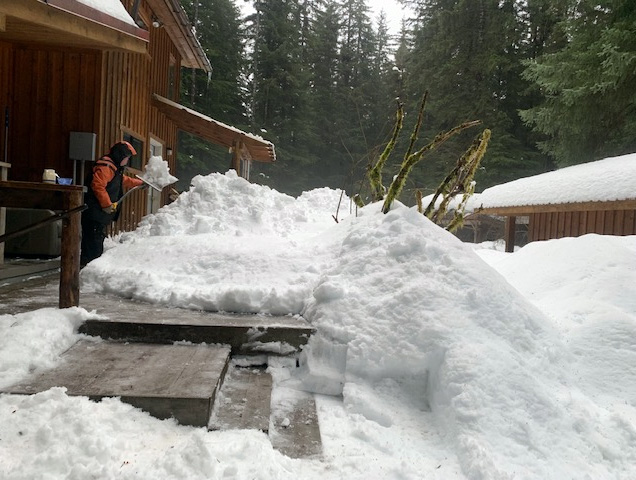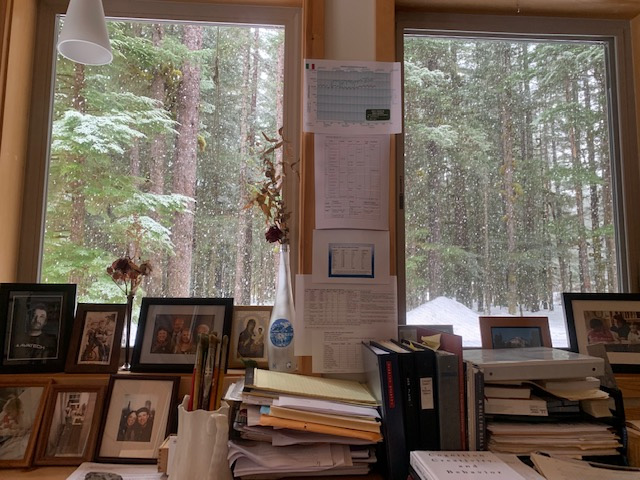A Blog of Flashbacks Depression after the Holidays
February 2022
I have never felt any winter bleakness or depression. It remains my favorite season and snow is my favorite weather. I look out my window now as the falling snow distracts me from putting a word on the page. Too many people find they feel depression or anger after the holidays. Perhaps itís the letdown after family gatherings. Maybe itís the darker hours, but the days are already getting longer. Living deep in the woods, we lose direct sunlight on our house from Halloween till Valentineís Day. Today we will have no direct sun as itís snowing, but I know if the clouds parted, weíd have several minutes of sun.
What happened to my January Blog? It snowed and snowed and snowed…and snowed. From the end of October to mid-January, we had had over ten feet of snow. Now we have 11.5 feet and it’s snowing again, but I don’t think today’s will last long. The result of over ten feet of snow was that during the second week of January the small building that held the technical aspects for our neighborhood’s Internet system collapsed. We were without service for about five days. I liked was that I had no Internet, no radio, no local, national, or world news. I had utter silence and much time to cross-country ski and even more to write. I learned that my reading of the news sucked up a lot of work time. I wrote four to six hours a day that week. I now limit myself to one hour a day of email, reading the paper, Facebook, and any other online activity unless directly related to my writing about behavior, behavioral data, poetry, or writing a book, blog, or anything else.
 |
Robert shovels part of the deck. Spring, or summer, will have to take care of the rest. I donít remember if there are three or four steps here. Weíll find out when the snow melts. |
In winter the ground is white, often lighter than the grey skies covering the rain forest in which we live. I don’t mind all the snow although we are running out of places to put this solid white stuff. Some days I laugh at the feeling that I live in the parking lot of a supermarket or mall. That’s how high the plow piles are.
After a cozy cup of tea, friend Judy and I, stand in front of one of the snow piles at my place. Our melodic conversations consist of snow, family (including our family gossip from decades ago), dogs, Wisconsin, New England, Alaska, laughter, always accompanied by a cup or two of tea and maybe a snack or meal.
 |
Judy (in light blue) after talking over tea and quiche. |
As I watch the snow, I flash back to February conversations in my office from the 1980s and 1990s, decades before the pandemic, but the February conversations haven’t changed.
“I’m not sure I want to come back here next year.”
“I’m thinking about getting a master’s in social work.”
“I want to transfer to a different school.”
“I want to leave teaching and go into ______.” (You fill in the blank.)
“I’m frustrated with my spouse.” (or maybe children, house, commute…you name it.)
Kevin Killeen gave a hilarious Twitter post from somewhere in Missouri that captures the malaise so many feel. One of my favorite quotes from him, “I avoid all major decisions in February—vacuuming, haircuts, swing dance lessons.” Since when did vacuuming become a major decision? In my house, nothing needs vacuuming that can’t wait a month any time of the year. My only exception would be if I had two dogs that shed constantly. Then I’d hire someone to come clean my house.
I still call February the longest month of the year because I think it is for so many people.
How did it get 28 days? I looked it up. Numa, the second king of Rome, chose February. That month became the host to Roman rituals honoring the dead. Thus, it was the unlucky month to consist of 28 days. Now, because 2,000 years ago it was the month of the dead, we still need behave as if we’re dragged down by it? No, I think it’s the gap between the joy of holidays and vacations at the end of last year and that gap when the weather warms up. That works for the Northern Hemisphere, but does it work for the Southern Hemisphere?
I wrote a friend in Australia. She responded at length, but what she said included that it’s harder to get exercise. Case in point, why am I writing and not walking at this moment? Yes, there is less sun, and living in a rain forest as I do, there’s a lot less sun. However, I grew up in a coastal climate and thought there was something wrong with the perpetual sunshine of my four years in Colorado. And yes, as we sit indoors, we do tend to think that this sitting around is a satisfactory way of life. A further yes, is that most people tend to prefer sunshine to clouds, rain, and the darkness. I enjoy forests, clouds, rain—snow even more—and darkness. How else could I have written Nikolin, the book of historical fiction in which a monk has himself bricked into a cave for the remainder of his days? What made it fiction is that I had to create a story of why he would feel the compulsion to be so isolated for the remainder of his life.
Me? I love the darkness of an Alaska winter. Farther south, seasons were less pronounced, so I didn’t notice them as much in Kansas or New England. Whether I could live in a cave or not, I’m less certain! However, I recognize that I am different from most people when it comes to need for light.
My husband, family of origin, and friends complain when there is too much rain or darkness. I know I must be sympathetic to them, but I prefer gloomy weather.
Last week, Paul Krugman, of the New York Times and winner of the Nobel Prize in Economics, titled his column, What to Do with Our Pandemic Anger. I thought about that a long while. I feel no anger, pandemic or otherwise.
What make most of us who live in our small community different? We live in isolation all the time anyway. We have a small grocery store in winter and two in summer, but often order food, household goods, oil or parts for vehicles from town. Town is Juneau, 50 to 60 miles away by boat or plane. We have 22 miles of road, 11 paved and 11 gravel roads connected only to one another. Our one main paved road leads to the airport, dock, or national park. We tend to cluster with friends or family and the pandemic did little to change those groupings. Most of the time when I’ve gone for a walk in my 25 years of living here, I see no one else. Even when we see other walkers, bikers, or skiers, we just wave. Cars or pickups pass me and we wave at one another. When we walk, anyone is usually a good 50 feet from another person, close enough to exchange hello or other pleasantries. We require no masks for such an outdoor distance.
It seems a community-wide practice throughout this and Canada’s remote areas, that if, for whatever reason, you don’t talk to someone socially, that does not apply if on a wilderness walk or on the ocean. The unspoken rule is that if someone is accidentally in the water, whether it’s the river or ocean water, whoever is there, helps the person or people. If someone is in the muskeg or on a remote trail and has a sprained ankle or worse, you help them. The other choice is that you leave the person to die. In that case, you’d better pack up that night and catch the next plane or boat to Juneau and beyond. No, anger cannot run that deep when living remotely.
When driving in the province of Yukon, Canada, in winter there are signs posted on the highway the one highway north out of Whitehorse. I forget the exact temperatures, but one says that a driver can’t pass up a hitchhiker if it’s 20 degrees F. Another says you have to stop to help a stopped car if it’s 0 degrees F. Of course, the temperatures on the signs are in Celsius. When I left Pelly Crossing 4 January 2004 and it was -47, your choice for Fahrenheit or Celsius, the person responsible for hiring me for the job said I needed to call the destination to tell them I was leaving. She also told me I needed to call her when I arrived. An hour beyond the expected arrival time, one or both of them would call the RCMP (Royal Canadian Mounted Police). I also had to leave in time to arrive in daylight. Once on the road and past the ke-lump, ke-lump, ke-lump of my flattened tires, which had heated and turned round again, I faced a snow-packed road of 383 kilometers, a three-plus hour drive. Yes, I had all the winter gear, food, and water for a potential breakdown. I also knew it was life-threatening to break down.
Although I’ve always been willing to listen, I guess I have small patience for a February depression. If someone has PTSD, however, I’m far more patient and will go for a walk with anyone who needs to get out of a depression or the house. Go for a walk every day, outdoors preferably. I’ll go with you. Protect yourself. Help or save a friend or stranger whatever the situation. We can get through February together.
 |
Snowing. View out my north study windows today. Hmm, looks like I have a lot to do. |

|
